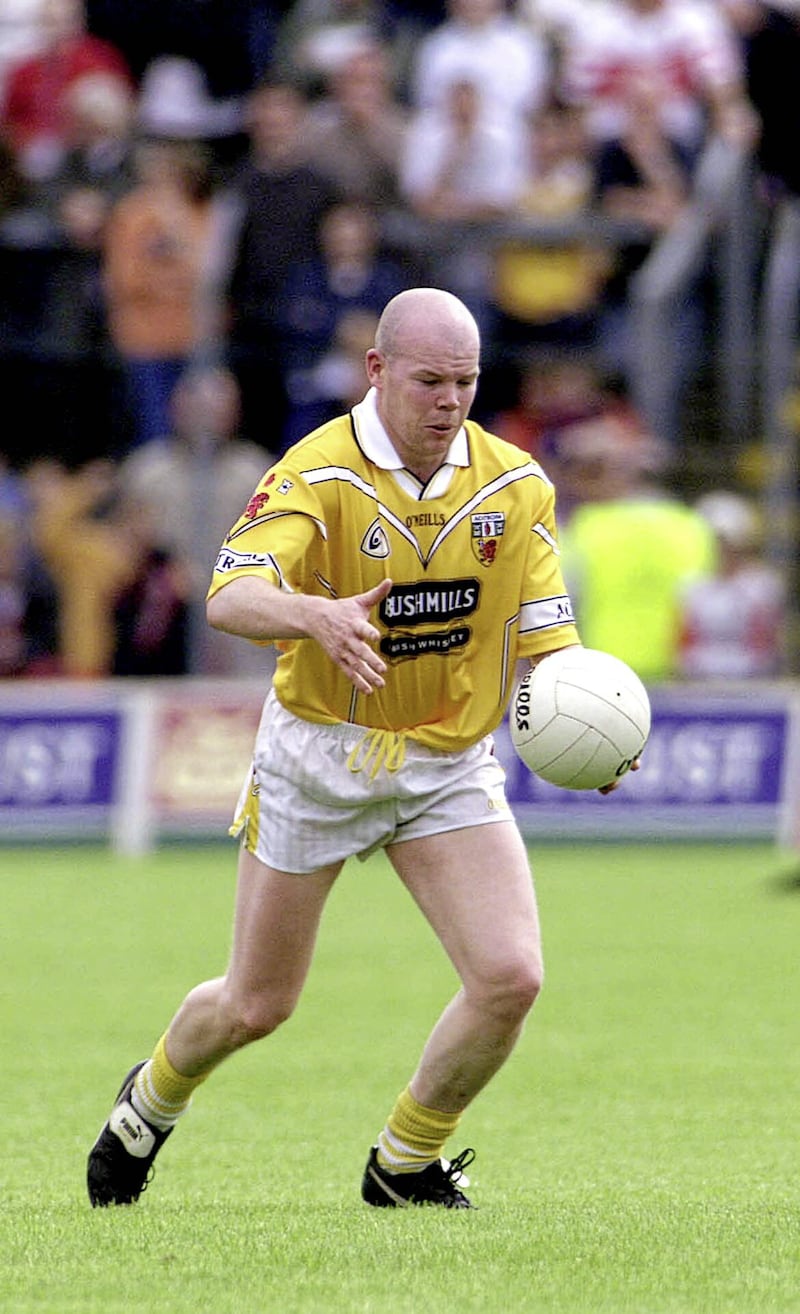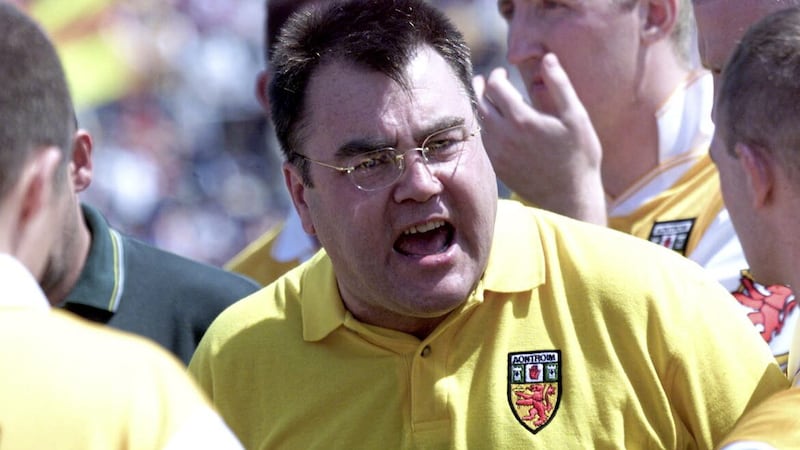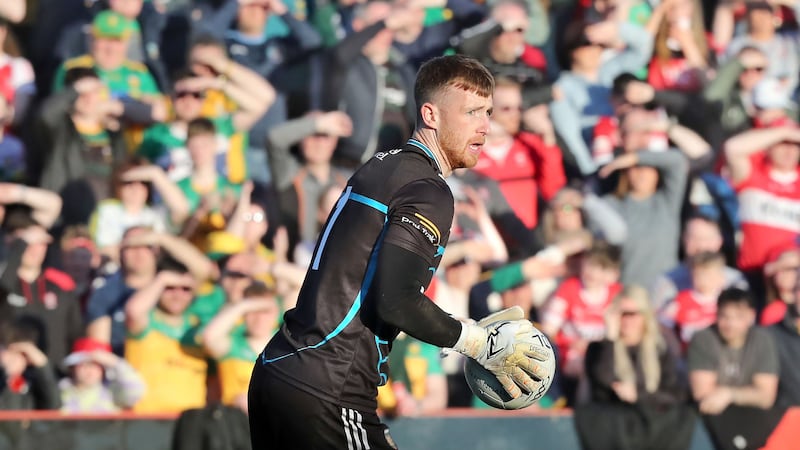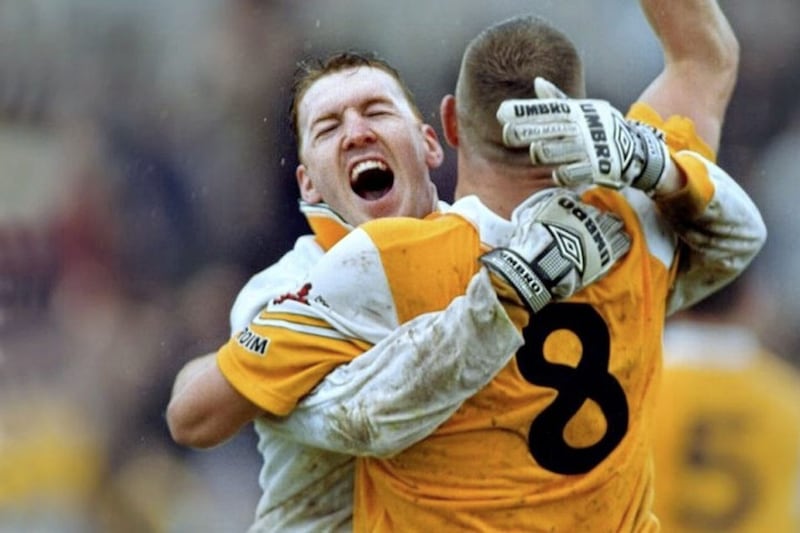IN the mind’s eye, Brian White can still see the high barbed wire fences, ominous watchtowers and lights of Long Kesh. Billy McKee is gripping his rosary beads, praying. He sees Bobby Storey, John Pickering and Mickey Lawless in the cages too.
His abiding image when he first landed in prison was of Bobby Sands, Danny Lennon and Paddy Molloy waiting to greet him as he entered Cage Eight.
Dark days.
It was a battle a day. Fighting for the most mundane things, like shoe polish or full access to a doctor.
The body searches were the worst.
For the three years he spent in the Kesh, his elders offered a soothing presence. Their stories, songs and jokes.
This wasn’t how he’d imagined his teenage years to be. A 16-year-old kid from west Belfast, a boy, imprisoned between 1972 and ’75.
It felt like yesterday he was fetching ball in midfield for St Teresa’s Primary school Gaelic football team alongside his friend Kieran Doherty, who would later die on Hunger Strike, aged 25.
“Doc was one of the most prolific midfielders I ever watched and played with or against,” says White, hugging a mug of tea in a quiet corner of Cultúrlann on the Falls Road.
“A natural talent. And then we walked in another direction, we walked through that together and ended up in Long Kesh.”
Caught in the eye of the storm, 16-years-of-age going on 30, teenage years snatched from his tenuous grasp. And there were many like him who joined the Republican movement.
He should’ve been up at Holy Child disco every Sunday night courting girls with his friends, living an ordinary life and “going through the house with a pair of football boots or a hurl in a kitbag: ‘Mummy, would you wash my gear? I’ve a match tomorrow night.’
“My mummy and daddy didn’t have much. My mummy had five jobs, worked seven days a week. She’d a cleaning job in the Convent up on the Glen Road, she worked behind two different shops, she’d a few other cleaning jobs and also worked in the tuck shop in Gilroy’s garage... She was the spine of our family especially as my daddy couldn’t work because of his illness.”
**************
GO and get a trade, son. It was late October 1971. A glorious Friday afternoon and White was due to go into work. He was 15 and serving his time to become an electrician.
“I had this really bad cold and my daddy knew I wasn’t bluffing; I didn’t know how to bluff,” White says.
Suffering from multiple sclerosis, his father would spend his days in either St Teresa’s chapel or “sitting up in Hannahstown carpark just looking out.”
On this particular Friday, his father wrapped a blanket around his son on the settee and made him tea and toast.
“The next thing we heard this noise. The British Army’s six-wheelers had a distinct sound. It was a squeal. The noise of it alone would terrify you.
“We lived up at the top of the Glen Road and the British Army came up with six-wheelers and ‘pigs’ [Saracens] and surrounded the upper part of our estate.
“I must’ve counted 40 or 50 trucks and at least 200 soldiers. Every house and any males above the age of 15 were arrested. We were all taken out. I was like a bear. Had I rioted? Yes. Absolutely – as the whole neighbourhood did. Had I done anything else? No.
“They came into the house and said: ‘Right, you and you have to go [my daddy and me]’. But my daddy was on a walking stick, couldn’t walk.”
Behind the old Greenan Lodge Hotel on the Black’s Road, now the Balmoral Hotel, a British army base had been set up.
“There was a big open hall and it was filled with all our neighbours. It was hilarious,” White laughs.
“The neighbours were calling my daddy, ‘Mr White, Mr White...’ and saying how it was a disgrace that he’d been lifted.
“It was our turn for interrogation and they brought me down the stairs to a cellar kind of a room. There was a blanket with a slit in it and this guy behind the blanket said: ‘Yes, that’s Brian White. He’s in Na Fianna.’
“I started shouting back at the guy behind the blanket: ‘What are you talking about Na Fianna?’
“He says: ‘I know you’re in Na Fianna’.
“I says: ‘You’re a f***ing liar because they won’t let me into Na Fianna!’
“One of them hit me in the stomach, and they kept saying: ‘Now promise us you won’t join Na Fianna?’
“Another soldier hit me with the butt of his rifle and said: ‘I’ll see that you won’t get in.’
“That was just an introduction as to what was coming next. Ballymurphy [massacre] had happened a couple months earlier and then ‘Bloody Sunday’.
“At the end of that year [1972] I was in Long Kesh. You learned very quickly how to become an adult. You go into an environment like that and you meet people of a common cause, if you want to call it, similar backgrounds, circumstances. It’s your time. And that was it.
“I used to love listening to the older men and the stories they’d tell. Billy McKee was in charge of our cage. Because I was the youngest, I’d have to do the rosary every night at six o’clock.
“To the older generation, their faith was everything... And then you had the searches. Whatever obstacles they fired at you, you had to deal with it.
“No whinging, no bitching. Accept your lot. I grew up a different way and I learned about that life.”
*****************
WITH an IRA ceasefire brokered in 1975, White gained early release in February of that year. Gaelic football and hurling ran through him like a stick of rock.
“I’d just turned 19 and the world outside looked different, completely different. I’d changed... But I wanted to play Gaelic football and hurling as soon as I got out... I had nobody because all my friends were school friends and all my friends were inside.”
He played for O’Connell’s GAA club for a couple of years – fashionably known as the “OCs”. Its heyday was back in the 1930s and 40s when they won a couple of senior football and hurling championships, but the club folded in the mid-70s.
The late Eddie Quinn – the “doyen of O’Donovan Rossa” – invited him to join the club. It was the best decision he ever made.
“What a fabulous club. Their history. Why they exist. What they stand for. It ticked all the boxes.”
O’Donovan Rossa won a couple of hurling championships in the early 70s and were always a highly regarded club in the county.
White played both hurling and football but was “better at the football”. He was part of the 1982 squad that won a senior league title and the '89 and '91 senior championship-winning squads.
White rhymes off the names of his team-mates: “Pat Armstrong, Gerard Armstrong, Jim Fagan, Mark Barr, Ciaran Barr, Brian McGurk, Hugh McGettigan, Ger Rogan, Paddy Rogan, Dee Barr, Tony and Ciaran Austin, Peter Murray, Jim Close, big Stevie Faulkner, Mickey Brady, Gurt Morgan, Dominic McEnhill, Sean Fleming... I’m bound to forget somebody.”
Sean McIlhattan of Lamh Dhearg introduced him to the Antrim senior football set-up in ‘79. A bull of a man, White could field a ball and was handy at midfield and full-forward.
He played on and off for his county for the best part of a decade. At 30, he thought his county days were firmly in his rear-view until Eamonn Grieve watched him playing a storming game against St Gall’s one evening.
“I was playing against big John Kennedy, Lord rest him, he was 6ft 5in, and somehow I had a smashing game. The following day, ‘Grievesy’ said: ‘I’ve got a role for you for Antrim’”
And his county career enjoyed an unlikely rebirth.
Life was good on and off the pitch for the larger-than-life west Belfast man.
Soon after being released from prison in ’75, he met Geraldine Hughes at a party hosted at the Hillhead Bar, once situated behind the Hunting Lodge just off the Stewartstown Road.
“So Bobby [Storey] and I went up to the party for a friend who was getting out and Bobby spots Gerri. He went over to her. I don’t know what happened, but later I went over and I said hello, and I ended up leaving her home that night – much to Bobby’s chagrin,” White laughs.
“And the rest is history.”
Gerri and Brian were married in February 1978. They had three children and led a very happy life together.
“What was life like with Gerri? How do you say perfect?”
“Now, we were talking bills, children and a house...”
Even before his playing days had ended, White was destined for the sideline. Charismatic and knowledgeable about the game, Jim Nelson approached him around 1996 to look after “these new things called county development squads” from U14.
Nurturing the best young players in Antrim was right up White’s street and he recruited the help of Dessie Reynolds, Brian Coyle, Aidan Thornbury and Ray McLarnon.
With these men at the helm, Antrim football was well and truly energised again. A few years later, White was persuaded to step up to take the county senior team.
The roots of Antrim’s much-talked-about Ulster Championship win over Down in 2000, ending an 18-year wait, was claiming the All-Ireland ‘B’ Championship the year before.
“The lads came in from the south west, that was a big thing,” White says.
Anto Finnegan of St Paul’s and Sheeny McQuillan of Cargin were the two undoubted leaders of White’s team.
“The reverence Sheeny had for Anto was special. Now, the two of them came together at times. But what a mighty, powerful pillar they were together in that changing room. Jesus. You just sat back and thought: ‘Wow.’”
Peter McCann, a key player on Antrim’s 1999/2000 team, says: “Firstly, ‘Whitey’ had a great backroom team and they had us so well prepared, and we knew ‘Whitey’ would make things happen.
“He made us feel special and he had the best players in Antrim playing for him.
“'Whitey' did so many wee things for us, he cared about us.”
On the day of the Down game at Casement Park, White, Hugh McGettigan, JC Devlin and Terry McCrudden had every box ticked, every pre-match minute accounted for. Nothing was left to chance.
Fifteen minutes before the Antrim players were due to take to the field, there was a knock on the changing room door. There, stood two friends of White – Herbie Slane and Gurt Morgan.
Everyone knew Dessie Reynolds, Antrim’s former minor coach and trusted friend of White’s, was terminally ill.
“I was taken unawares. Herbie said: ‘Dessie’s outside, he wants to talk to you and would you mind if he talked to the players.’
“I said: ‘Lads, we’re going onto the pitch here in 15 minutes.’
“Herbie says: ‘I understand that, ‘Whitey’. Do what you can.’
“I said to Hugh, Terry and JC. So we said: ‘Why not.’ Dessie’s health was bad, he could hardly see and had to be helped into the changing room. These were his players from underage – [Kevin] Madden, [Kevin] Brady and the rest...
“The lads were transfixed when Dessie began to speak. It was unforgettable. How can I talk about this without crying? There was a silence in the changing room. I didn’t plan it and it could’ve gone the other way.
“I just thought: Big Dessie? What of it. We’ll win next year. We’ll live with the consequences of it. It was the right thing to do.”
Antrim’s renaissance turned out to be all too brief. An almighty row broke out in the county final a couple of months later between Cargin and St Paul’s and did irreparable harm to the Antrim senior team.
In 2002, White was forced to leave the Antrim post…
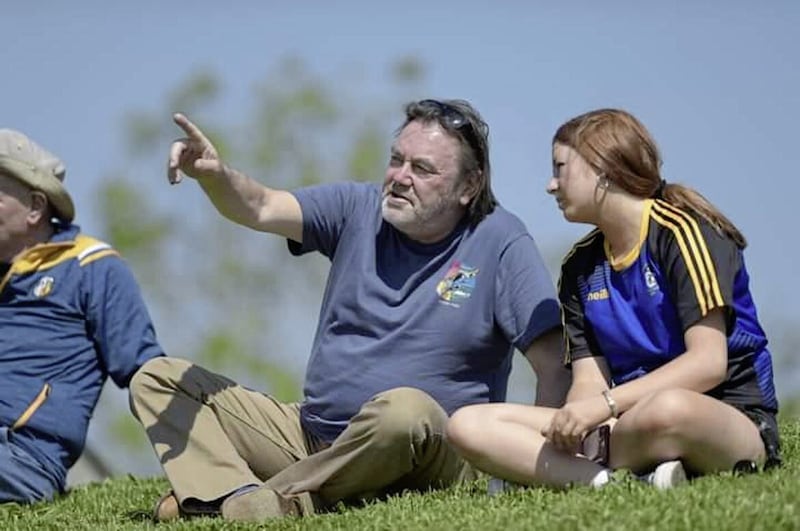
“GERALDINE White, please?”
Little did the Whites know that when you turned right coming out of consultant surgeon Sigi Refsum’s office, you went home. If you turned left, you’d cancer.
Gerri and Brian turned left. Gerri was diagnosed with an aggressive form of breast cancer in February 2002. Their lives and those of their children were turned upside down in a ruthless instant.
“What I noticed was the amount of women on their own who turned left. Some of them were crying,” White remembers.
Gerri underwent surgery a few weeks later. All of a sudden life became more precious.
She was in remission for a few years and the White family lived life in the fullest sense, spending endless days up in Machaire Rabhartaigh (Magheroarty), a little Gaeltacht village in Donegal.
Football management took a back seat – even to the extent where White politely declined an offer to meet with the Donegal County Board, via his close friend Fr Seán Ó Gallchóir, about the prospect of becoming their next manager.
“Ah, father I can’t. Gerri’s not well. It’s come back,” White said.
Another Brian – Brian McIver – ended up taking the Donegal reins.
Gerri passed away on October 13 2006, a Friday morning at five-past-eight. It’ll be her 18th anniversary next Thursday.
“Memories are for living and reliving because those memories you bring back to your mind are the happiest ever,” White says.
“Jesus, phenomenal. Most of them are based around Donegal. It’s a fantastic journey through life. My kids have been my crutches and I’ve been there for them. And they’ve kids now. We’re all close. We’ve five grandchildren.”
He met Karen in more recent times – “a beautiful woman and a big part of my life. I just feel God has given me a second chance.”
***************
AND Dear Anto...
Nobody would utter it, but everybody thought: maybe this man’s indomitable spirit could cheat Motor Neurone Disease forever.
Over the last decade, Anto Finnegan always talked about his life-limiting illness as being a “series of losses”. Physical losses. From holding a cup of tea – to not being able to hold a cup of tea.
The class of 2000 still meet up for their annual reunion. ‘Whitey’, McCann, Brady, Madden, big Joe Quinn, Sean McGreevy, Gearoid Adams... Anto was the driving force for meeting up.
“The funny thing about it is,” says McCann, “every time we get together it’s like we’ve stepped back into the changing room. No awkwardness, just straight back in to where we were in 2000.”
“The centre of our activity was always Anto – getting him there, getting him back home,” says White.
“God love Alison, Conall and Ava, driving him down to the city centre and getting him into these places. That was a challenge of its own. Anto was the heart of the slagging – ruthless, cut through you very quickly, no prisoners. Very, very intelligent. You needed a bullet-proof vest.”
Anto passed away a year ago last month. White remembers turning on his phone and seeing texts coming through from McCann, Quinn and Adams.
“I think it was Peter McCann’s message I opened: ‘Whitey, have your heard anything about Anto?’
“I didn’t read the rest. I got up and I phoned Joe Quinn. And that was it. Desperate, desperate, desperate...”
Brian White's is a life lived. He's endured some horrendous twists on his road.
Cage Eight. Meeting Gerri. And then losing her. His three beloved children and five grandchildren - and worshipping the ground they walk.
Cut him as deep as you want and he'll bleed O'Donovan Rossa blue and gold. Shaking up Antrim football and creating the kind of archive that will glow forever.
Meeting Karen. Walking the holy ground of Machaire Rabhartaigh. And the love of his native tongue. The sheer fun he gets from managing the Antrim Masters. Still exhilarated by life.
Sitting in Cultúrlann on the Falls Road for a few hours on a Friday afternoon, positive energy seeps from his every pore.
"You can wish for all you want – be thankful for what you’ve got."
